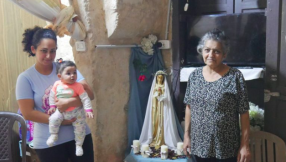In a considerable journalistic coup, Times journalist Anthony Loyd has secured an interview with Shamima Begum, the only known survivor of three London schoolgirls who left Britain in 2015 to join Islamic State.
It is, in its way, quite chilling. Begum volunteered to marry an IS fighter, with whom she had two children, both now dead. She is now in a Syrian refugee camp, nine months pregnant with her third child, and wants to come home for its sake. But she has no regrets, and speaks with utter indifference of seeing the severed head of a murdered captive in a bin: 'It was from a captured fighter seized on the battlefield, an enemy of Islam. I thought only of what he would have done to a Muslim woman if he had the chance.' Asked about videos of beheaded Western hostages, she says that 'Journalists can be spies too.'

She describes herself as 'weak' for fleeing the battlefield; her dead friends, on the other hand, were 'strong'. She wants to come home and live quietly with her child.
It's not as simple as that, of course. In the eyes of the law, she's now an adult, and responsible for her actions in supporting the most brutal and murderous regime of modern times; in the eyes of many others, though, including former counter-terrorism chief Mark Rowley, she's a victim, groomed for violence by cynical adults. Rowley told the Today programme this morning that what was needed was a proper risk assessment with a view to rehabilitation.
And there is, indeed, a case for saying that young people of a certain age are not really responsible for their actions. Uganda's infamous Lord's Resistance Army under Joseph Kony took young children, forced them to kill their parents or other children, and turned them into monsters. Everyone acknowledges the complexities of reaching a judgment in the case of someone like Dominic Ongwen, whose trial continues.
While the moral plasticity of a six- or seven-year-old is undeniable, however, the Bethnal Green Academy schoolgirls were 15. In just a few months, they would have been old enough to join the British army, had they been so minded. Certainly there is a strong case for taking Begum's relative youth into account in any decision about her future. But it's hard to avoid concluding that there are other factors at play here. One is the fetishisation of teenagerhood that sees it as a golden time, an extension of childhood in which youth in all its purity unfolds flower-like to the waiting world. This is an illusion that persists in spite of all evidence to the contrary, and effectively denies moral agency to young people. Yes, they are more easily influenced. But they ought to know rape and murder are wrong, and if they choose not to see that we are entitled to blame them for it.
Another factor is the modern discomfort at the reality of evil. When Harvey Weinstein and Kevin Spacey were outed as serial sex pests, to put it no more strongly than that, their response was not contrition and repentance; that traditional religious route to restoration is old hat. Instead they went into therapy. So, the thinking runs, they didn't do what they did because they were bad, but because they were ill – it wasn't really their fault.
Christians ought to believe in restoration. After all, we have a profound sense of our own sinfulness and need for grace. But the Christian version of restoration is likely to be different from the world's. Will Shamima Begum be brought to see the error of her ways through counselling and therapy? Perhaps, and that would be a good thing. But from the point of view of the victims whose heads she saw, 'unfazed', in rubbish bins, and of their grieving and traumatised families, more appropriate would be a profound sense of guilt at being part of such brutality.
And then, perhaps – and not before – they could begin to talk about forgiveness.
Shamima Begum may have been a victim. Well, so are many of those who have bad reasons for doing bad things. But they are culprits, too.
Follow Mark Woods on Twitter: @RevMarkWoods













